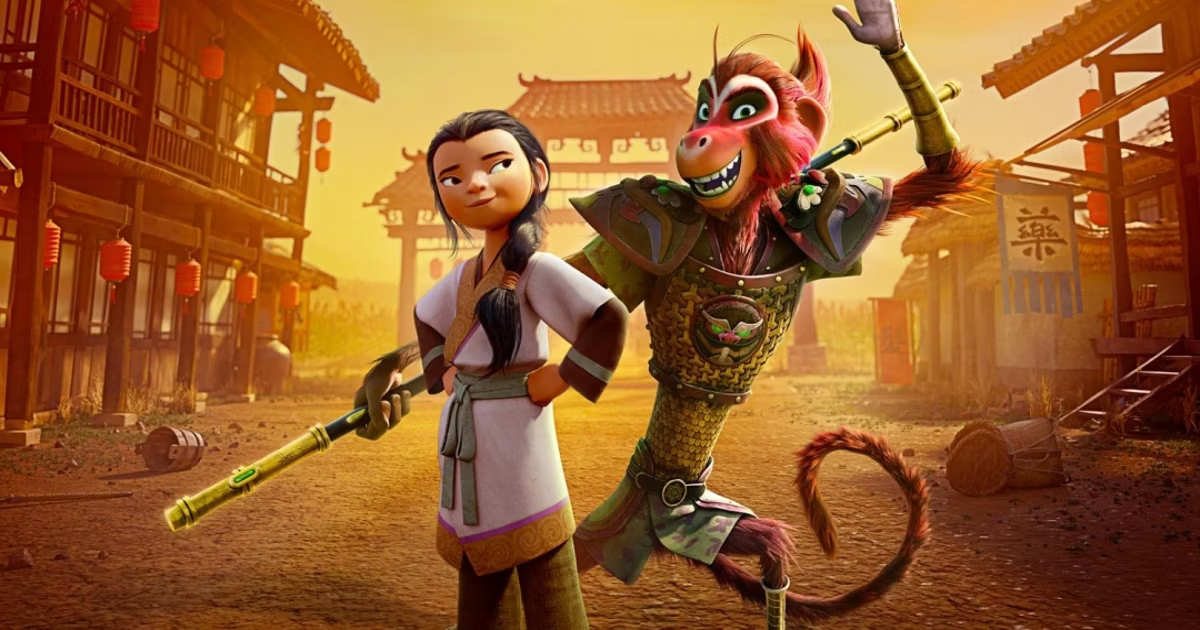Netflix’s The Monkey King is an animated film about growing up, but it has difficulty finding its feet. The premise is engaging, and the animation is colorful at times. However, what holds back The Monkey King are the elements that are more ordinary about it– its action is lackluster and its main character is unlikable.
Based on the Chinese novel Journey to the West, The Monkey King follows the adventures of young primate Sun Wukong (Jimmy O. Yang). As a figure of great power, this personage has appeared in various media throughout history often being portrayed as a rebellious trickster who eventually becomes a hero. This time around Sun Wu Kong is different. Spending most of his formative years alone while being ostracized by society for looking different or acting out he mostly represents an extended adolescence’ immaturity rather than clever yet mischievous scoundrel which we usually get from portrayals like these; instead here unfortunately what we get presented with painfully naïve irresponsible creature.
The story revolves around Sun Wukong trying to become who he was always meant to be. In order for him achieve immortality (which would improve his social standing) he decides that proving himself by defeating one hundred demons should suffice as enough credit towards impressing gods. However deep-seated resentment from having grown up poor and lacking humility taints every heroic endeavor made by our troubled protagonist whose quest initially starts off seeking acceptance but evolves into yearning adulation – any collateral damage during battles becoming nothing more than an afterthought along way thematically speaking it makes sense too much so if you ask me since why not have such selfishness shown through reckless actions repel people away instead? It also fits within traditional treatment of this character type… except for one thing: there aren’t any redeeming qualities found anywhere near within new interpretation!

This iteration however comes across all wrong; really annoying rather than endearing like able or lovable even. He doesn’t have that heart of gold good inside him which might make everything else forgivable here instead spends majority those precious ninety minutes focusing solely upon himself – all while it’s clear to see Yang putting some comedic timing into his line delivery unfortunately there just isn’t enough material support such efforts throughout movie though having said that there is a funny moment involving executive producer Stephen Chow’s Shaolin Soccer so at least they attempted slapstick humor somewhere amidst these self centered shenanigans.
Lin (played by Jolie Hoang-Rappaport) acts as Wukong’s young sidekick and voice of reason throughout most story at hand acting like Pinocchio’s conscience or Jiminy Cricket if you will where her portrayal seems believable enough due largely because whenever things get really bad for them both emotionally speaking she shows true feelings towards what has just happened but Bowen Yang’s The Dragon King serves only little more than serviceable villain who isn’t particularly memorable when compared against others within genre this being said though there are still some moments where we can appreciate how slickly delivered lines were executed by Mr. Yang adding occasional moments levity when otherwise would be none present within film containing lukewarm antagonists.
The other actors don’t really stand out, despite their talent. As The Dragon King’s minions Benbo and Babbo, Jo Koy and Ron Yuan were good enough. The same can be said for Hoon Lee and Jodi Long portraying the Jade Emperor and Wangmu; they’re solid but forgettable — a label that could apply to The Monkey King as a whole.
If it isn’t the breakneck pacing or the uneven visual treatment, it’s lackluster action scenes from which The Monkey King suffers. Most of the story is on autopilot, which makes sense early on as motivations are being established, but that quickness never really lets up as it speeds through most of Sun Wukong’s feats; out of 100 slayed demons, we only see him fight two of them. Quiet moments of reflection are also robbed of their power; they’re nipped in the bud by another action sequence or silly encounter just as soon as they get going.
Then there’s the animation. While characters look decent thanks to a vibrant color palette, much of the world is rendered bare. For any given environment other than this film’s one random village, there’s very little if any distinguishing details at all. Even hellish and heavenly realms that heroes travel to aren’t interestingly designed; both settings would look pretty much alike in terms of their significance if not for some basic thematic differences (hell is dark forever) and idea that different entities live there. They’re two more generic stops on Sun Wukong’s journey.
Most of this could be forgiven if The Monkey King had good fight scenes. Most battles are over before you know it — finished moments after they’ve begun — and ones that last a bit longer are rather dull, with choreographed bouts failing to capitalize on energetic prowess of beings waging war against one another what’s point showing us cloning ability when most duplicates get dispatched offscreen? Things fare worse when gods get involved — their attacks, magical or otherwise, do nothing to reinforce fabled status as all powerful beings. Like most everything else about The Monkey King, their larger-than-life presence proves to be unremarkable.
The Verdict
Netflix’s The Monkey King is a potentially great film undone by poor pacing, uneven animation and a truly unlikable protagonist. Most of which could have been salvaged with enough comedic moments and/or some entertaining action sequences. Alas, there’s very little in the way of humor here and the fights are dull, if not entirely forgettable. And while the talented cast does their best to breathe life into their characters, their efforts ultimately fail to make The Monkey King better than the sum of its parts.
Watch The Monkey King on Kimcartoon









